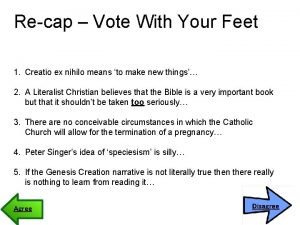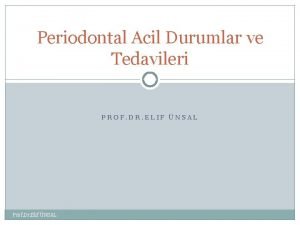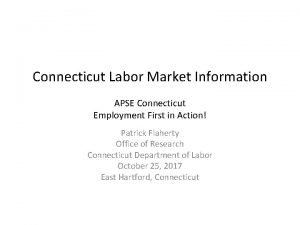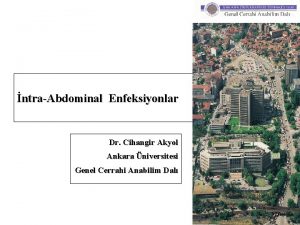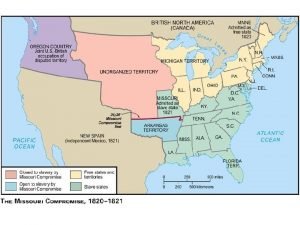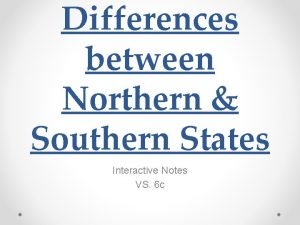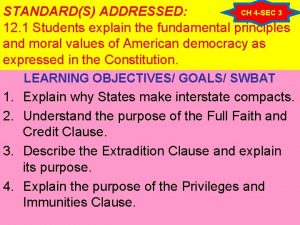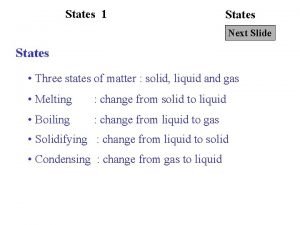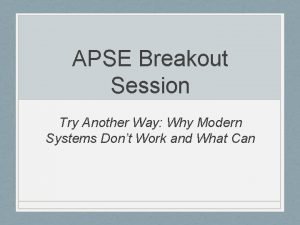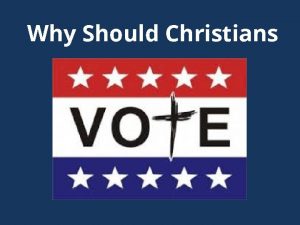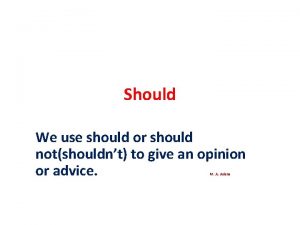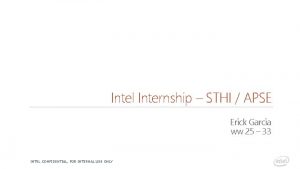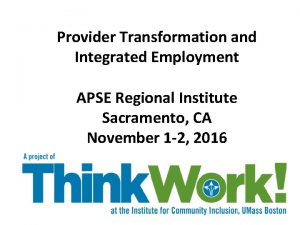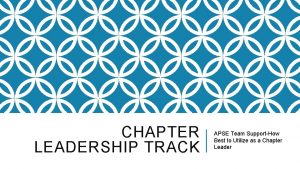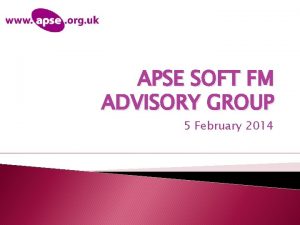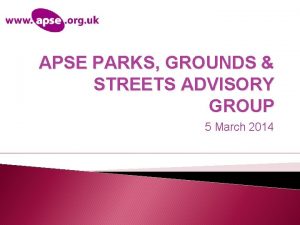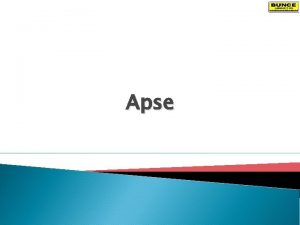APSE JUNE 22 2017 Agenda Why States should

























- Slides: 25


APSE JUNE 22, 2017 Agenda: Why States should implement Supported Employment – Joe Marrone WA DBHR’s history and focus on Employment – Melodie Pazolt 1115 Medicaid Transformation Demonstration Overview King County’s history and focus on employment – Lisa Floyd WA DBHR’s current efforts to implement Supported Employment using grant funds and pilot projects – Lisa Bennett-Perry

Social determinants of health are the economic and social conditions that affect health outcomes and are the underlying, contributing factors of health inequities. Examples include housing, educational attainment, employment and the environment.

Unemployment is bad for your health: • Higher rates of unemployment cause more illness and premature death. • As job insecurity continues, it acts as a chronic stressor whose effects grow with the length of exposure; it increases sickness absence and health service use. http: //www. euro. who. int/__data/assets/pdf_file/0005/98438/e 81384. pdf 4

Employment Rate through UI data for adults in outpatient mental health services WA State 2013: Q 1 2013: Q 2 2013: Q 3 2013: Q 4 2014: Q 1 Individuals Total with SSNs 50, 387 50, 834 48, 812 47, 962 51, 165 Employed Clients 4, 514 5, 183 5, 184 4, 960 5, 142 9% % Emp WAGES Weekly Hours 11% 10% $754 $766 $782 $788 $12. 10 $11. 97 $11. 80 $12. 15 $11. 99 Monthly Wages Wage Rate HOURS 10% 14 15 15 Washington State Department of Social & Health Services 15 15

Building on Opportunities – Housing & Employment: • Legislative direction to improve client outcomes (Employment and Housing) and use Evidence-based, Research-based, and Promising Practices – SB 5732 -HB 1519 (2013) • Nationally Recognized Policy Academies (Housing 3000: Chronic Homeless Policy Academy & Olmstead Policy Academy) • Supportive Housing and Supported Employment services authorized in SB 6312 (2014) • Healthier Washington SIM Grant - CMMI 6

Centers for Medicaid & Medicare Services (CMS) • Policy Bulletins – Housing-Related Activities and Services (2015) – Technical Guide regarding employment and employment related services (2011) – First Episode Psychosis – Supported Employment Services for young adults (2015)

Medicaid Requirements 1115 Medicaid Transformation Demonstration Fidelity to Evidence-based practices Outcomes & Sustainability

Housing and Employment For Better Health: An Update on the Medicaid Transformation Demonstration 9

Medicaid Transformation demonstration 10

Medicaid transformation goals Over the five-year demonstration, Washington will: – Integrate physical and behavioral health purchasing and service delivery – Convert 90% of Medicaid provider payments to reward outcomes – Support provider capacity to adopt new payment and care models – Implement population health strategies that improve health equity – Provide targeted services that address the needs of our aging populations and address the key determinants of health 11

Medicaid Transformation Demonstration • Five-year demonstration of innovative strategies to improve health outcomes and use resources wisely • Authorizes up to $1. 5 billion in federal investments • Three initiatives: Transformation through Accountable Communities of Health Up to $1. 1 B Incentive Payments Long-term Services and Supports $175 M Services Foundational Community Support Services $200 M Services

Foundational Community Supports (FCS) 13

Foundational Community Supports What it isn’t • Targeted Medicaid benefits that help eligible clients with complex health needs obtain and maintain housing and employment stability. • Supportive Housing services • Supported Employment services • Ongoing payments for housing, rent, or room & board costs • Wages or wage enhancements for clients • Entitlement 14

Supportive housing Communi ty Transitio n Services (NEW to FCS) One-time supports for individuals transitioning out of institutions or at imminent risk of becoming institutionalized Includes rental deposit, move-in costs, household furnishings and other necessary supports Communi Housing assessment and development of a ty plan to address barriers Support Assistance with applications, community Services resources, and outreach to landlords Education, training, coaching, resolving disputes, and advocacy Supportive housing services do not include funds for room and board or the development of housing. 15

Community transition services NOT room & board • One-time expenses Provided today under 1915 c waivers • WA: COPES Waiver, DD Community Transition Services Institutional level of care • Eligibility limited to a subset within the target populations who meet an institutional level of care • “Institution” will be defined in protocol 16

Supportive housing target population • Chronically homeless (HUD definition) • Frequent/lengthy institutional contact • Frequent/lengthy adult residential care stays • Frequent turnover of in-home caregivers • PRISM Score 1. 5+ • (Predictive Risk Intelligence Syste. M) 17

Supported employment Individual Placement and Support (IPS) model Principles of supported employment • Open to anyone who wants to work • Focus on competitive employment • Systematic job development • Prioritize rapid job search • Client preferences guide decisions • Individualized long-term supports • Integrated with treatment • Benefits counseling included Services may include • Employment assessment and development of a plan to address barriers • Assistance with applications, community resources and outreach to employers • Education, training, coaching to maintain employment 18

Supported employment target population • Aged, Blind, Disabled (ABD)/Housing and Essential Needs (HEN) • Individuals with severe and persistent mental illness, individuals with multiple episodes of inpatient substance use treatment and/or cooccurring • Working age youth with behavioral health conditions • Individuals receiving long-term services and supports 19

Medicaid funds flow Current Model Medicaid Program oversigh t HCA – DBHR – ALTSA TPA Benefits administr ator Provider SH/SE CBOs SH/SE – Health care providers SH/SE – Comm. BH Agencies 20 Data SH/SE – LTSS Providers SH/SE – Tribal Providers

Provider reimbursements • Rates TBD • FCS Cost Model per user, per month: – Supportive Housing: $575* – Supported Employment: $550* • Encounter units – Supportive Housing: Monthly – Supported Employment: ¼ Hour *Cost model does not represent actual 21 rates for services

Foundational Community Supports Next steps Foundational Community Supports protocol • Protocol must be approved before services can be provided Third party administrator • Procurement released March 24 th WAC • HCA: Program authorization • DBHR: Certification WAC Initial provision of services to begin July 2017 • Benefits will be provided statewide 22

Learn more at www. hca. wa. gov/hw Features: • Demonstration videos • Fact sheets • Timeline 23

Join the Healthier Washington Feedback Network. Sign up at: hca. wa. gov/hw Send questions to: medicaidtransformatio n @hca. wa. gov 24

Thank You! Melodie Pazolt Recovery Support Services Supervisor DBHR Department of Social and Health Services Melodie. pazolt@dshs. wa. gov (O) 360 -725 -0487
 Hey hey bye bye
Hey hey bye bye Tree of life apse mosaic
Tree of life apse mosaic Anug belirtileri
Anug belirtileri Periton irritasyonu nedir
Periton irritasyonu nedir Bob apse construction
Bob apse construction Anal tıkaç
Anal tıkaç Cihangir akyol
Cihangir akyol Flacs checkpoint b spanish exam june 2018 answers
Flacs checkpoint b spanish exam june 2018 answers Gartner 2017 cio agenda pdf
Gartner 2017 cio agenda pdf Agenda sistemica y agenda institucional
Agenda sistemica y agenda institucional Dont ask
Dont ask What were the 11 free states
What were the 11 free states Northern and southern states
Northern and southern states Tyranny
Tyranny What are the 5 shapes of states
What are the 5 shapes of states Why did the united states invade cuba in 1898?
Why did the united states invade cuba in 1898? No state can make unreasonable distinctions
No state can make unreasonable distinctions Why do states cooperate and compete with each other
Why do states cooperate and compete with each other Why did the united states imperialize
Why did the united states imperialize Why are motives described as hypothetical states?
Why are motives described as hypothetical states? Why did the us invade cuba
Why did the us invade cuba Chapter 6 human geography of the united states
Chapter 6 human geography of the united states Why should i be discouraged
Why should i be discouraged Who invented lewis dot structure
Who invented lewis dot structure Most fad diets do follow the mypyramid guidelines.
Most fad diets do follow the mypyramid guidelines. Why football players should wrestle
Why football players should wrestle

